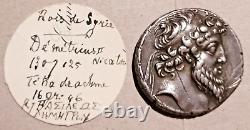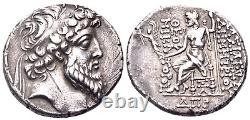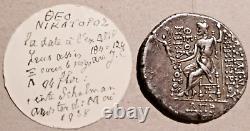SELEUKID KING Demetrios II Nikator 129-126 BC Tetradrachm With original note





SELEUKID KING: Demetrios II Nikator, second reign, 129-126/5 BC. Tetradrachm (Silver, 28 mm, 16.46 g, 1 h), Damascus, year 184 = 129-128. Diademed head of Demetrios II to right. S Zeus Nikephoros seated left, holding Nike in riht hand and scepter in left; below throne, monogram of?? Some scratches in the obverse field, very fine. From the collection of a Nobleman that died in 1940, ex Schulman 31 May 1938, 169 (collectors ticket included). Issued during the second reign (130-125 BC) : The Seleucid kingdom was now but a shadow of its former glory, and Demetrius had a hard time ruling. He was apparently unpopular, perhaps from memories of his humiliating defeat and general discontent with the decline of the Empire, and perhaps from resentment that he had lived while so many Seleucid soldiers and family members sent to Parthia had died. To the good luck of Demetrius, however, Phraates II was faced by an invasion from Sacaen nomads to his east.
The Parthians attempted to use captured Greeks against the Sacaeans, but they mostly defected, and Phraates was killed in battle. The next Parthian king, Artabanus, also had a short and violent reign fighting in the east rather than to Parthia's west. This gave the Seleucid Empire a temporary reprieve from the Parthian threat. At the time in Ptolemaic Egypt, a power struggle developed between Queen Cleopatra II and her brother king Ptolemy VIII. Cleopatra had the support of the Greek administration in the capital Alexandria, while Ptolemy VIII had the support of the countryside and native Egyptians.
Cleopatra II might have sent out a request for aid to Demetrius II, or he might have gotten an impression from travelers and spies that Ptolemy VIII's government was weak. Around 128 BC, Demetrius II mounted a military expedition to Egypt to "save" Cleopatra II.Ancient sources roundly condemn Demetrius II for this action as foolish when so many problems were on-going for the Seleucid Empire. A modern historian, John Grainger, defends it as a reasonable gamble: small forces had set off waves of defections before in recent history, so if Ptolemy VIII was truly as unpopular as reported, it might work. More generally, the geopolitical situation for both the Seleucids and Ptolemys was desperate enough that uniting the remaining great Greek states might be the only way for them to maintain their relevance, given that Antigonid Macedonia had been crushed by Rome in the preceding decades. Demetrius II camped outside the fortress of Pelusium, the gateway to Egypt, but Ptolemy VIII's troops remained loyal; there was no mass defection. It was Demetrius' own troops that mutinied in the dry desert.
King Ptolemy VIII reacted by finding another potential Seleucid royal claimant to undermine the obviously hostile Demetrius II. He found and sent a man named Alexander II Zabinas, the alleged illegitimate son of Alexander Balas, to fight a civil war against Demetrius, backed by the Ptolemies. The remainder of Demetrius' reign would be spent fighting a slowly losing battle against Alexander II. He retained the loyalty of Coele-Syria and Cilica, but not the capital Antioch. In 126 BC, Demetrius was defeated in a battle at Damascus.
He fled to Ptolemais but his wife Cleopatra Thea closed the gates against him. He was succeeded by the victorious usurper, Alexander II, while his queen, Cleopatra Thea, ruled in Ptolemais Akko in co-regency with two of their sons, Seleucus V Philometor and Antiochus VIII Grypus.This item is in the category "Coins & Paper Money\Coins: Ancient\Greek (450 BC-100 AD)". The seller is "rare_minerals" and is located in this country: CH.
This item can be shipped worldwide.
- Denomination: Tetradrachm
- Historical Period: Greek (450 BC-100 AD)
- Cleaned/Uncleaned: Cleaned
- Composition: Silver
- Provenance: Ownership History Available
- Year: 129 BC
- Era: Ancient
- Grade: Ungraded
- Certification: Uncertified
- Date: 129-126/5 BC


